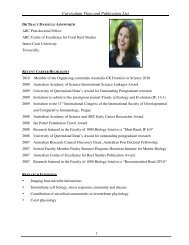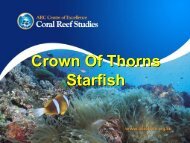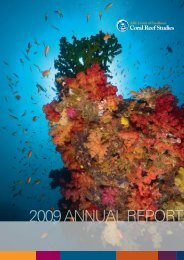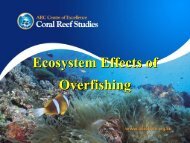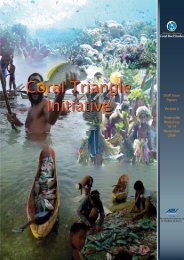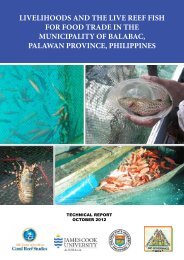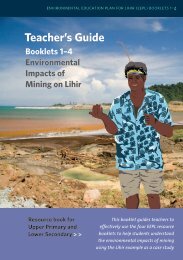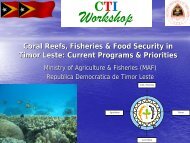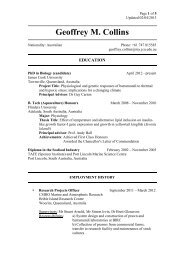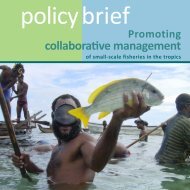Download - ARC Centre of Excellence for Coral Reef Studies
Download - ARC Centre of Excellence for Coral Reef Studies
Download - ARC Centre of Excellence for Coral Reef Studies
Create successful ePaper yourself
Turn your PDF publications into a flip-book with our unique Google optimized e-Paper software.
Program 1Evolutionary andenvironmental changeResearchersMalcolm McCulloch (ProgramLeader)Roger BradburySean ConnollyOve Hoegh-GuldbergTerry Hughes (Research Fellow)Stacey Jupiter (Research Fellow)Michael Kings<strong>for</strong>dJanice LoughPippa Moore (Research Fellow)John PandolfiRobert SteneckKnowledge <strong>of</strong> the past improves ourability to predict future infl uences <strong>of</strong>natural environmental variability, humanimpacts, and climate change on coralreefs. <strong>Centre</strong> researchers use fossiland historical records to develop novelmethods to identify potential causes<strong>of</strong> global change in biodiversity andecosystem function. Together withecological studies, this broad array <strong>of</strong>work provides a unique perspectiveon community change that rangesfrom centuries to millennia. Two newPostdoctoral Fellows were recruited toProgram 1 in 2006 - Stacy Jupiter fromthe USA, and Pippa Moore from the UK.Program 1 is documenting the ecologicaleffects <strong>of</strong> climate change duringthe Quaternary interval, in order tounderstand how regional diversitypatterns respond to climate change.Researchers from the UQ and ANUnodes, led by John Pandolfi and MalcolmMcCulloch have focussed on the upliftedHolocene reefs <strong>of</strong> the Huon Peninsula,Papua New Guinea. Similar studiesare also underway along a latitudinalgradient on Western Australian coralreefs. In WA, Malcolm McCulloch isutilizing the 5-6m higher sea-levelsassociated with warmer conditions <strong>of</strong>the Last Interglacial period to provide abenchmark <strong>for</strong> understanding future risesin sea level. In another project, Pandolfiand colleagues have found persistencein coral community structure from raisedreef terraces <strong>of</strong> Barbados through a115 ka interval. These studies showhow analysis <strong>of</strong> ecological patterns infossil coral reefs can provide estimates<strong>of</strong> the natural variability <strong>of</strong> coral reefcommunities in the absence <strong>of</strong> humaninteractions.In February, the <strong>ARC</strong> <strong>Centre</strong> held aworkshop in Townsville to plan a researchstrand on the issue <strong>of</strong> shifting baselines,focusing in particular on the social,economic and environmental history <strong>of</strong>the Great Barrier <strong>Reef</strong> and its catchment.This is a joint Program 1 and 5 set <strong>of</strong>projects, involving all nodes <strong>of</strong> the <strong>ARC</strong><strong>Centre</strong>.This year, Program 1 and 2 launched anew multi-disciplinary, multi-nationalcollaboration to study the origins andevolutionary development <strong>of</strong> the shallowmarine biota <strong>of</strong> the Indo-Pacifi c regionover the last fi fty million years. Ledby John Pandolfi and David Bellwood,the project currently comprises topresearchers from Australia, Europe andSoutheast Asia, involving universities,museums, oil companies and privateconsultants. These specialists aretackling a range <strong>of</strong> geological andecological issues around a central theme<strong>of</strong> the plate tectonic development <strong>of</strong> S.EAsia, the stratigraphic response, and theaffect this has on coral reef, sea-grass,and mangrove biota. The initial focus<strong>of</strong> the group is to compile and interpretfaunal turnover data to investigatethe Indo-Pacifi c longitudinal diversitygradient. The <strong>Centre</strong> sponsored an initialmeeting <strong>of</strong> the group in Leiden, theNetherlands, in December.Research on water quality commencedin 2006 in Princess Charlotte Bay, inthe northern GBR, a new collaborationbetween the <strong>ARC</strong> <strong>Centre</strong> and theAustralian Institute <strong>of</strong> Marine Science.The principal researchers involved areMalcolm McCulloch, Stacy Jupiter,Janice Lough and Katarina Fabricius. Aseries <strong>of</strong> coral cores have been collectedfrom reefs <strong>of</strong>fshore from the mouths<strong>of</strong> the Normanby and Kennedy Riverswhich drain into the bay. These coreswill provide a continuous 100-200 yeargeochemical record <strong>of</strong> changes in waterquality along an inshore to outer reefgradient. Preliminary observationsalready suggest that previous perceptionsregarding the relatively pristine nature <strong>of</strong>the region may have been ill-founded.Community participation in Program 1and 4 in 2006 is exemplified by ongoingresearch addressing long-term changes inwater quality in the Mackay-Whitsundayregion <strong>of</strong> the central Great Barrier<strong>Reef</strong>. This project, involving Pr<strong>of</strong>essorsHoegh-Guldberg (UQ) and McCulloch(ANU), PhD student Guy Marion, andresearch fellow Stacy Jupiter, hasdemonstrated the strong connectivitybetween coral reefs and the adjacentPioneer River catchment and estuariesbordering the reef. The project isreceiving considerable support by theMackay Council, the Mackay-WhitsundayNatural Resource Management Groupand GBRMPA, but also notably thewider Mackay community. The <strong>ARC</strong><strong>Centre</strong> continues to provide advice to theMackay City Council, which has a veryactive program in improving water qualityvia improvements in storm-water outletsand fl ood mitigation.14



